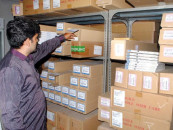Engineering Development Board: an obituary
Body curbed industrial progress rather than enhancing it

PHOTO: EXPRESS
Established in 1995, EDB’s objectives were to strengthen engineering sector, promote exports, increase technical training and enable import substitution which was later termed as deletion policy. In 2004 another autonomous organization, the Experts Advisory Cell, established in 1979, was merged into EDB. A quick look at these objectives and a bird’s-eye view of Pakistan’s industry today point to a foregone conclusion: none of the objectives associated with EDB or EAC was achieved.
In the name of industrial development, the EDB actually played a role in curtailing industrialization by imposing restrictions on import of several products, parts and raw materials. The now defunct EDB used to have “Input-Output Coefficient Office”. This office collected data on the inputs required by hundreds of manufacturing firms, rationed it, issued a permissible wastage level for thousands of products and thus defined a level of desired output.
The Engineering Development Board defined ideal ‘waste ratio’ of more than 1,000 manufacturing related imported items. The Board updated this data regularly and used these trends to administer quotas for granting permission of manufacturing concerns. This forced all engineering firms and manufacturers of the country in selected sectors to seek approval from EDB on how much they could import.
On a typical day, one could witness senior business executives sitting in front of Input-Output Coefficient officials, who had the audacity or the bliss ignorance, to instruct the firms about the permissible level of imports. When a business executive shared growth plans of his firm which required higher levels of import, the erstwhile Input-Output Coefficient officer would take previous year level of output as benchmark ignoring the pleas based on future plans.
This is what I wrote in an earlier article: “In order to fix this problem, at the very least, this Input-Output Coefficient function should be immediately abandoned and in the long run the Engineering Development Board must be abolished. Firms should have complete freedom to import the inputs they need.” I am happy to see this wish come true.
EDB was not promoting industry, it was protecting it. According to a Garry Pursell-Ashraf Khan study, out of the 1,006 products which EDB listed as “locally produced”, 91 per cent had only one producer, 4.5 per cent had two producers and only 4 per cent had three or more producers. This indicated a highly protective regime for these industries that has badly hurt the consumers, particularly in the auto sector. EDB allowed local companies to seek further protection. For example, the import of simple ball points was not allowed unless an input was sought from local manufacturers.
To protect these industries the EDB in liaison with other ministries was effectively involved in import licensing of the inputs which were subject to concessionary regime while high and, in some cases, prohibitive final product tariffs were used against import competition.
In an official presentation earlier this year, the CEO of EDB enlisted several “achievements”. Essentially this list comprised eight SROs that it had managed over years. These SROs defined the discretionary powers that EDB was mandated with. One of the SROs was titled “Give price preference to local industry over imported goods.” It had the power to determine the local manufacturing status of goods imported by the petroleum sector, and could curtail imports in case of pressure from the local manufacturers.
One of the useful functions that EDB performed was collection of industrial data, which could be used to understand various trends. I hope that this can be transferred back to the Planning & Development Division, from where originally EDB was created.
EDB’s board had a fair representation from the private sector, but this is one example where mere representation is not helpful. As a matter of fact, presence of industry leaders from the engineering, auto, fans, textile, chemicals and steel sectors actually strengthened the industry protection agenda of EDB. It is believed that the Prime Minister abolished EDB as he saw this is as a hurdle in a free market driven auto policy.
EDB is no more. It is a welcome development. It will cut government intervention and curb protectionism. It will also allow firms to freely decide import of raw materials, which will be critical for product development. The writer is Founder of PRIME Institute, an independent think tank based in Islamabad
Published in The Express Tribune, July 3rd, 2017.
Like Business on Facebook, follow @TribuneBiz on Twitter to stay informed and join in the conversation.



















COMMENTS
Comments are moderated and generally will be posted if they are on-topic and not abusive.
For more information, please see our Comments FAQ